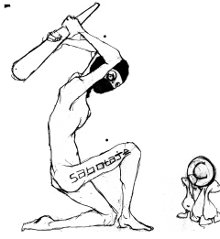SOPA and PIPA “undermine the internet’s fundamental architecture” professor James Boyle of Duke University said. And he is certainly right. Not by chance yesterday Massimo Gaggi on the Corriere della Sera reported the sarcasm of Chinese newspapers towards the implementation of the censorious barriers entailed by the approval of these bills. There is little space for rejoicing, to say it all. If by any (unlikely) mean the Stop Piracy Online Act and the Protect IP Act would succeed, even in their watered-down versions – against those initially proposed in US House of Representative and Senate – we would be witnessing a steady twist of the Internet as we knew it in the West.
The identity of the Internet – we should know it by now – is something temporary and the transformation of its main features (as, precisely, its architecture) is able to twist the practices of social communication that run through it.
And so what? The battles against SOPA and PIPA are most righteous ones, sacrosanct, to be absolutely won. At least in a tactical perspective. But please, let’s not picture these as battles for freedom of speech and, even less, to preserve those conditions of openness that turned Internet into the biggest agora in the history of mankind. The risk here is to jump out of the frying pan into the fire, without even realizing it.
Jimmy Wales told it: ”We need to send Washington a BIG message”. And so it has been. After a 24 hours-long shutdown, the support of thousands of websites (some of which very popular) the backing of many signatories of the bills evaporated. But they who really added fuel to the fire of the first “Web Strike” were neither Wikipedia, nor even the thousands bloggers that sincerely joined the initiative, but the big internet companies like Google, Facebook, Yahoo, Twitter and Ebay. Without the lobbying of the big ICT companies, it is unlikely that the success of the blackout would cause equally crushing aftershocks. Still, it is difficult to match such companies to concepts like ‘freedom of expression’ or ‘open internet’. It’s not like that their neighbours, the majors of discography and Hollywood cinema, would enjoy better references – they promoted uncountable legislative, repressive and technological attempts to impose some form of control over the web, to perpetuate their parasitical rent as market near-monopolists – but the 2.0 web giants that currently claim to back the open web and the freedom of speech are the very same that, for some time by now, had run entire portions of Internet as absolute authorities in closed worlds.
Even mercifully leaving out Microsoft’s presence in the “coalition of the willing” deployed against the axis of evil that threatens internet freedom, other remarkable details cannot but stand out. What to say, for example, about Amazon backing the struggle against SOPA – rightfully considered a bill able to endanger whistleblowing activities – considering the stance adopted by the company of Jeff Bezos little more than a year ago, during the sinking of Wikileaks’ network at the height of the Cablegate? How is it possible to consider Google o Facebook as warrantors of the digital rights, as these companies are building veritable “walled gardens”, watertight environments separed by the rest of the web? Companies whose CEOs, moreover, daily remove a plethora of politically troublesome profiles, or just not pertaining to their moody and whimsical policies.
«Sticking feathers up your butt», as Fight Club’s Tyler Durden said, «does not make you a chicken». And in spite of the ICT giants’ many efforts to pass themselves off as the defenders of the new library of Alexandria, the truth is another. That is, today Google and Facebook don’t call up to defend freedom of speech, but a specific business model. Theirs. The alternative at stake is not generically between freedom and censorship, but between antithetical ways to conceive the information market. The clash is between those who strive to protect intellectual products, according to a costly and obsolete logic, and those who would like to see them freely circulating to fuel the profitable cooptation of the creativity of the social networks. A political clash, besides an economical one; because in a world of user-generated-content, where the language is made by remixing pre-existent cultural objects, to decide on the legitimacy of a content means to have the power to intervene on the communication networks. But this is a power that Google and friends already wield unopposed in their private informative ecosystems, and whose exclusivity they want to retain without having to share it with anyone – as strong as they are of the centrality of their web services. Not only in the Internet geography. But also in modern social communication, of which they are fully entitled constituent elements.
The battle against the bills signed by Lamar S. Smith was the umpteenth clash of power in a Netwar started by the campaign against Pirate Bay and developed in various local settings (as the Google vs Vividown case in Italy). The hefty stake is the market of information and its rules, now written by new players that permanently ousted the old ones. There is no more space for the old fogeys like Rupert Murdoch, the utmost champion and distinguished supporter of SOPA and PIPA. He who did bring Myspace to collapse when it was at its height and was facturing billions. He who lashed against the free character of online newspapers. He of the “News of the world” scandal. He who, in spite of its tailored facades in 140 characters’ shots, remains the living embodiment of the entartainement majors’ hardline, made up by 10 years of media terrorism, defence of parasitical market attitudes and Kafkian trials against hundreds of P2P networks’ users. He who, in front of the flight of all those who swiftly retired their backing to the infamous bills (or otherwise face a diminished consent as the november presidential election approaches) couldn’t but comment with a laconic “Politicians all the same”.
Yes. The presidential election. Because the battle against SOPA and PIPA was an important step for it, as shown by the veto menace aired by Barack Obama, if these were to succeeed. A stand that is not a simple favor to the masters of Silicon Valley. Truely, ICT’s big shots are well-grounded in Washington (and particularly at the State Department’s table). But is also true that, historically, the democrats always had most strong connections with the audiovisual industry scene interest groups. Moreover, both S.Francisco and Los Angeles are fundamental pieces of USA’s soft power. But the words of the defeated John P. Feehery, a MPAA lobbist, leave little room for doubt. The content industry has no idea about how to address people, while the internet companies manage to mobilize them by means that the studios could not even think of. The “Internet Strike” last January 18 showed it clearly. Obama would have never approved a bill that could put obstacles in the way of such powerful companies, able to so deeply condition worldwide public opinion. Never he would have taken responsibility in causing a negative drift in weblife exacerbating millions of people, a lot of them being US voters. One can but imagine the possible recoils on his campaign. Obama did no favor to Google&Co. Simply, right now, he fears them.
Subdued one of the richest lobbies in the US industry, leaned on the “world’s most powerful man”, the internet companies are now left with a fistful of battles to win, to be able to lay down that very freedom of expression that they claim to defend. The EU lawsuit against Google for its monopolistic market dominance remains and, above all, the breaking up of Net Neutrality: ready to give way to a new grand design of the web, modeled after market-imposed arguments. At the threshold, a two speed Internet – one for the rich people, one for the poor – awaits us. As we were saying in the opening, architecture matters.
As we write, we hear about the FBI seizure of Megaupload and Megavideo, two of the world’s most visited websites. A repressive op with worldwide aftershocks that, regardless of its original driving force, will beef up opposition to the controversial law proposals. In the blink on an eye Anonymous knocked out the websites of all the US entertainment industry lobbies and #megaupload is on Twitter’s trending topics, while groups bent on saving Megavideo are flourishing on Facebook. Let’s see if in the next days Kim Schmitz, the founder of these websites, will be acclaimed as a martyr of free speech (and surely, of the big profits he earned by embracing the cause).
Was the one against SOPA a victory? It may be. If and only if the 99% will be able to transform a battle against obscurantism into one against digital capital, by imagining means to address towards a permanent strike (as we, not Google, like it) our communication against the global governance of information.
InfoFreeFlow (@infofreeflow) for Infoaut



Ultimi commenti